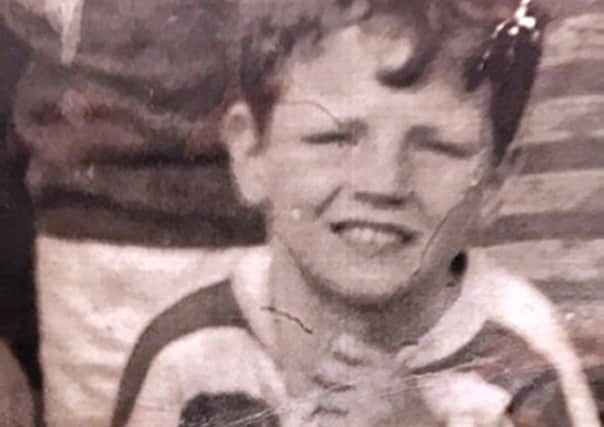Francis Rowntree inquest: Ex-officer regrets rubber bullet death


Francis Rowntree, 11, died two days after being struck by the military projectile while walking through the Divis Flats complex close to the Falls Road in April 1972.
Addressing his family from the witness box at Belfast Coroner’s Court, Trevor Veitch, who was in charge of ground operations in the area that day, said: “I express regret that this has happened and it has taken 44 years to get more information that they have been seeking.
Advertisement
Hide AdAdvertisement
Hide Ad“It is an extremely sad thing that happened. Clearly I regret it.”
The long-awaited inquest, ordered by Northern Ireland’s Attorney General John Larkin, was hearing oral evidence for a third day.
Mr Veitch, who rose to the rank of Lieutenant Colonel, added: “I just hope that the information that has been given to them (family) will make things a little clearer and a little more acceptable.”
Controversy surrounds the shooting, with disputed claims on whether the boy was hit directly or injured by a ricochet, and if the bullet had been doctored to make it potentially cause more harm.
Advertisement
Hide AdAdvertisement
Hide AdAt the time Lt Col Veitch was a company commander with 3rd Battalion The Royal Anglian Regiment in charge of at least 120 soldiers.
He was unaware rubber bullets could kill and had never encountered any soldier inserting broken glass or batteries to make them more dangerous, the court heard.
“I have never ever come across any tampering of ammunition of any sort,” he said.
“I think it is a horrible idea and I could not believe it happened with my people. But, then you cannot see everything that goes on.”
Advertisement
Hide AdAdvertisement
Hide AdAlthough he has no independent memory of the day or the incident involving Francis, the retired officer said he was sure his unit would have been under threat when the baton gun was fired by another soldier in his vehicle.
Lt Col Veitch said: “I was convinced at that time that we were under threat. I was able to see through the side hatch, people were telling me from their view round the back.
“I had a very good idea of the threat.”
Although there were no specific orders to deploy baton rounds on the day in question, direction was given that they be used to keep rioting crowds at bay, the court heard.
Their purpose was to ensure blast bombs or petrol bombs could not be thrown underneath or inside the armoured “Humber Pig” vehicle.
Advertisement
Hide AdAdvertisement
Hide AdWarnings were not routinely given and Lt Col Veitch said he trusted the judgment of his men.
“I do not believe that any of my soldiers were going to be firing on anyone when there wasn’t a riot,” he said.
The identity of the soldier who fired the baton round is protected by a public interest immunity certificate but he was described in court as a man of integrity.
Lt Col Veitch said: “He was very calm. I had never seen him, at that time, lose his cool and lose his control.”
Advertisement
Hide AdAdvertisement
Hide AdWhen asked by Martin Wolfe QC, representing the Ministry of Defence (MoD), if Soldier B was level headed, he replied: “Yes.”
The court heard the Royal Anglians had started their first tour of duty in the Troubles just over a week before Francis was shot.
It was a particularly turbulent time, coming just months after Bloody Sunday in January 1972.
One member of the battalion had already been shot dead.
The unit lost eight soldiers during 1972 with 17 soldiers killed throughout the 30-year sectarian conflict in Northern Ireland, the court heard.
It was busy and dangerous, according to Lt Col Veitch.
Advertisement
Hide AdAdvertisement
Hide AdLt Col Veitch also rejected earlier eyewitness evidence that the soldier would have had a good view of Francis who was not carrying anything and was not acting aggressively.
He said: “You cannot judge the view of a man whose weapon is seen protruding from a vehicle. He was standing behind that weapon trying to aim. He was wearing a helmet with a visor. He was a big man and would have a fair amount of equipment on and there were four other people in the back of the vehicle.
“To aim out of that hatch was difficult. He would have to crouch down and try to aim his shot as accurately as possible.
“It was extremely difficult.”
Francis Rowntree, a pupil at St Finians Primary School, suffered extensive skull fractures and lacerations of the brain and died in hospital on April 22 1972.
Advertisement
Hide AdAdvertisement
Hide AdThose who offered first aid described in statements how his forehead had been crushed and hair was “scalped”.
In another statement read to the court, Teresa Rowntree said her son was “unrecognisable”.
Indeed, Mrs Rowntree was advised by a priest to seek a second medical opinion over doubts that a rubber bullet could cause such extensive damage, it was claimed.
A report by the now defunct Historical Enquiries Team found he had been an innocent bystander.
Advertisement
Hide AdAdvertisement
Hide AdOutside the court, Jim Rowntree rejected the expression of regret over the death of his young brother.
He said: “Regret and sorry are two completely different words. You can say you regret it is raining but you don’t say you are sorry for it.
“I want them to say they are very sorry that they took the life of an 11-year-old child.”
Soldier B is expected to give evidence via video link on Thursday.